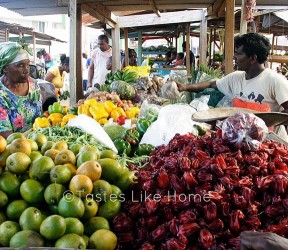Hi Everyone,
“We cannot afford to mortgage our palettes to foreign producers” – Freundel Stuart
The Barbadian Prime Minister made this remark at the opening of the recently concluded annual local Agricultural Festival (AGROFEST).
It was a bracing comment given that 85 per cent of the food consumed in Barbados is imported. All across the region, the price tag of food importation bills is high. In some countries it is higher than others. While various governments, politicians, interest groups and individuals climb platforms and hug podiums, touting that now worn phrase: ‘buy local, eat local’, the truth is that not much is being done beyond the rhetoric. By golly, we do talk a good talk in the Caribbean.

One can often hear parents complaining that they cannot get their children to eat certain things, especially local foods. There is a very popular radio announcer who moderates Barbados’ top-radio talk show (Down to Brass Tacks) who laments that he cannot get his teenage children to eat things like ground provisions, drink fresh local fruit juices etc. That is a sentiment that gets repeated over and over again across the region. For me, it begs the question, who is responsible for teaching, cooking and feeding our children our food? These days, children – and by children, I mean those all the way up to young adulthood – have the freedom to pout, dictate and as I’ve said before, choose and refuse food. It is almost as if parents have relinquished their roles and handed over the reins of responsibility for feeding the family to the no-money-earning members of the group.

I agree that parenting has changed. I know some people say that more women are in the workforce and with both parents working it is not possible to cook three hot meals per day. However, things have not changed so drastically. My parents and the parents of generations past worked outside the home. And one has to give jack he jacket, there are parents today who work outside the home and still make the time to cook for their families. The issue here is not necessarily about cooking at home but about what we are cooking at home, and what we are feeding and passing on to our children.

My age may be showing, but it wasn’t that long ago that you ate what was put in front of you. One learnt to appreciate the effort and sacrifice that was made to provide for you. Even when you despised what was in front of you and wanted to frown or pout, you did so behind your parents’ back, out of respect. Never in front of their faces because we knew somewhere in the back of our minds, that this food did not come easily and it did not come cheaply. Even if you didn’t eat all of the food, you had to at least eat some of it. And trying something is the only way to determine whether or not you like it.
Times were hard then and times are hard now. We can talk all we want about the high food importation bills, and while there will always be bills, we as consumers can try making more conscious decisions. On a micro level, we can dictate what we buy and put on our plates. For example, we can opt to shop at the market first so that we can support local farmers. We can lobby our governments to work out ways to do more to help local farmers and fisher folk. If space permits, we can start our own little kitchen gardens. At meal times, we can practice various forms of democracy. We can mix and match local and imported ingredients, we can negotiate quantities and we can offer rewards and privileges. I am not saying that children should not have the freedom to choose what they want to eat or drink, but there has to be some balance. Let me share with you a tiny example, and this is something that I know of personally and have witnessed.
On more than one occasion when a relative and her son would come on vacation, we would go to the supermarket and it was mainly to pick up juices. Imported boxed juices that come in individual little boxes or packets with accompanying straws.
The first time they’d visited and it happened I was perplexed because I had made guava juice, soursop punch, mango drink and a fruit punch – all from local fruits. Mark (not his real name) refused to touch any of the drinks/juices. Imagine my bewilderment then when we were stocking up imported fruit drinks (and of the same flavours!). His mother explained that he likes the boxed juices, and she allows him to have it because when it comes to his overall eating, she has no problems with him. Mark loves (and requests) mostly vegetables and seafood, particularly fish. Now, that is the kind of balance and democratic eating I am talking about. It is not about outright deprivation. His food preferences and choices are influenced by what his mother cooks and feeds him.
We do not plant and grow everything in this part of the world and even with our palettes hankering for foreign foods, we have a right, a duty and a responsibility to feed our children and ourselves locally. We have an obligation to teach the values of eating local (and seasonal). As Mr Stuart said, “We cannot afford to mortgage our palettes to foreign producers.”
With freedom comes responsibility.
Cynthia
Cynthia@tasteslikehome.org
www.tasteslikehome.org





